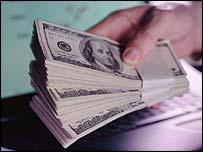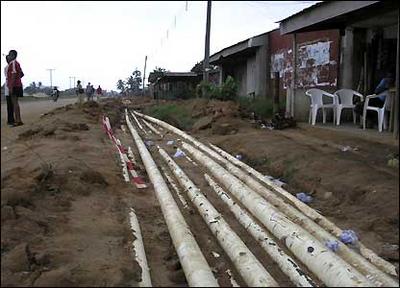"YAHOO-YAHOO" NIGERIAN INTERNET SCAM SPAM: DON'T BE A VICTIM!

The greed for American dollars and to get rich quick have driven thousands of young Nigerians to the Internet for the sole purpose of Scams. What they now now "Yahoo-Yahoo" in Nigeria. They use chicanery and flattery to deceive, hoodwink and to rob their foreign victims in America, Europe, Australia, Asia and the Middle East.
No day passes without seeing these Scam spam in the e-mails. But, mostly in free e-mail accounts. The best advice is to delete them immediately you see unsolicited spam mail.

Oil pipelines run through Nigerian villages. But, the billions of dollars Nigeria makes daily from crude oil and gas exports have been stolen by corrupt Nigerian rulers and their contractors. Over 200 billion pounds have been stolen by the corrupt civilian and military rulers in Nigeria since Shell struck oil in the country in 1956. The greediness and wickedness of these Nigerian tyrants and power brokers of the Nigerian oligarchy have left the majority of the over 135 million Nigerians in ruins as the picture above shows.
We have to republish this very important report already widely circulated, because most people have the problem of recollection of such things that we know could make a lot of difference. The sooner the people in America and Europe in particular stop responding to Internet Scam spam mail, the better for us all in Nigeria and others in the world. Because, we want the rest of the world to stop calling Nigerians bad names and to stop painting Nigeria bad in the global village. If you ignore these Internet scammers, they will stop. If you really want them to stop, then you should stop responding to them. It takes two to tango. How can you claim millions of dollars you have not won? When did you play the lottery? How did they get your e-mail address when you did not subscribe to them. Heh! Dollars don't grow on trees. Let us agree now to stop the notorious Nigerian 419 Internet Scammers! All right?
Internet Spam and Scam in Nigeria
Business Archive
August 7, 2005 BY DULUE MBACHU.
LAGOS, Nigeria.
Day in, day out, a strapping, amiable 24-year-old who calls himself Kele B. heads to an Internet cafe, hunkers down at a computer and casts his net upon the cyber-waters. Blithely oblivious to signs on the walls and desks warning of the penalties for Internet fraud, he has sent out tens of thousands of e-mails telling recipients they have won about $6.4 million in a bogus British government "Internet lottery." "Congratulation! You Are Our Lucky Winner!" it says. So far, Kele said, he has had only one response. But he claims it paid off handsomely. An American took the bait, he said, and coughed up "fees" and "taxes" of more than $5,000, never to hear from Kele again. Festac Town, a district of Lagos where the scammers ply their schemes, has become notorious for "419 scams," named for the section of the Nigerian penal code that outlaws them.
YOU DON'T KNOW ME ...
No one knows for sure which of these dodges, if any, were invented in Nigeria, but fraudsters in the West African nation have made them so famous that they are often called ''419 scams,'' after the clause in the Nigerian penal code that outlaws them. A look at some of the more common ones: ''You don't know me, but I used to be married to a corrupt dictator ...''
Nigerians are most commonly associated with scams featuring purported officials or relatives of dead dictators seeking help in getting millions of dollars out of Nigeria or any other African country. Victims are promised a large chunk of the money supposedly stolen from the state treasury, but first must put up money to show their trustworthiness. Variations include proposals for lucrative oil, construction or procurement contracts purported to have been issued by some state-owned company or government department, all with the object of extracting payments from the victim in the form of taxes, fees and bribes to facilitate the promised payoff. ''You're in luck ...'' Targets are told they have come into some sudden fortune and need only complete a few bureaucratic procedures to claim it. These procedures turn out to be costly. Victims are often churches and charities, which are told that a millionaire somewhere has willed them a fortune. ''You Are Our Lucky Winner!'' Millions of e-mails are sent telling recipients they have won millions of dollars (or any hard currency) in an ''official Internet lottery.''
The ''winners'' are given the name of an agent who will handle upfront ''taxes'' and other levies. ''Your price is right ...'' A scammer contacts someone selling a car or other valuable over the Internet and accepts the advertised price. The scammer sends the seller a check for perhaps twice the amount, then claims to have made a mistake and asks the seller to wire the difference to a bank account in Nigeria or elsewhere. The seller obliges, then discovers the check sent to him is fake. AP
In Festac Town, an entire community of scammers overnights on the Internet. By day they flaunt their smart clothes and cars and hang around the Internet cafes, trading stories about successful cons and near misses, and hatching new plots. Festac Town is where communication specialists operating underground sell foreign telephone lines over which a scammer can purport to be calling from any city in the world. Here lurk master forgers and purveyors of such software as "e-mail extractors," which can harvest e-mail addresses by the million. Now, however, a 3-year-old crackdown is yielding results, Nigerian authorities say. Nuhu Ribadu, head of the Economic and Financial Crimes Commission, said cash and assets worth more than $700 million were recovered from suspects between May 2003 and June 2004. More than 500 suspects have been arrested, more than 100 cases are before the courts, and 500 others are under investigation, he said.
The agency won its first big court victory in May when Mike Amadi was sentenced to 16 years in prison for setting up a Web site that offered juicy but phoney procurement contracts. Amadi cheekily posed as Ribadu himself and used the agency's name. He was caught by an undercover agent posing as an Italian businessman. This month, the biggest international scam of all -- though not one involving the Internet -- ended in court convictions. Amaka Anajemba was sentenced to 2-1/2 years in prison and ordered to return $25.5 million of the $242 million she helped to steal from a Brazilian bank. The trial of four co-defendants is to start in September. Why Nigeria? There are many theories. The nation of 130 million, Africa's most populous, is well-educated, and English, the lingua franca of the scam industry, is the official language. Nigeria bursts with talent, from former NBA star Hakeem Olajuwon to Nobel literature laureate Wole Soyinka. But with World Bank studies showing a quarter of urban college graduates are unemployed, crime offers tempting career opportunities -- in drug dealing, immigrant-trafficking, oil-smuggling and Internet fraud. The scammers thrived during oil-rich Nigeria's 15 years of brutal and corrupt military rule, and democracy was restored only six years ago. "We reached a point when law enforcement and regulatory agencies seemed nonexistent. But the stance of the present administration has started changing that," said Ribadu, the scam-busting chief.
President Olusegun Obasanjo is winning U.S. praise for his crackdown. Interpol, the FBI and other Western law enforcement agencies have stepped in to help, said police spokesman Emmanuel Ighodalo, and Nigerian police have received equipment and Western training in combating Internet crime and money-laundering.
Experts say Nigerian scams continue to flood e-mail systems, though many are being blocked by spam filters that get smarter and more aggressive. America Online spokesman Nicholas Graham said Nigerian messages lack the telltale signs of other spam -- such as embedded Web links -- but its filters are able to be alert to suspect mail coming from a specific range of Internet addresses.
Also, the scams have a limited shelf life. In the con that Internet users are probably most familiar with, the e-mailer poses as a corrupt official looking for help in smuggling a fortune to a foreign bank account. E-mail or fax recipients are told that if they provide their banking and personal details and deposit certain sums of money, they'll get a cut of the loot. But there are other scams, like the fake lotteries. Kele B., who won't give his surname, said he couldn't find work after finishing high school in 2000 in the southeastern city of Owerri, so he drifted with some friends to Lagos, where he tried his hand at boxing. Then he discovered the Web. Now he spends his mornings in Internet cafes on secondhand computers with aged screens, waiting "to see if my trap caught something," he said. Elekwa, a chubby-faced 28-year-old who also keeps his surname to himself, shows up in Festac Town driving a Lexus and telling how he was jobless for two years despite having a diploma in computer science. His break came four years ago when the chief of a fraud gang saw him solve what seemed like "a complex computer problem" at a business center in the southeastern city of Umuahia and lured him to Lagos. He won't talk about his scams, only about their fruits: "Now I have three cars, I have two houses and I'm not looking for a job anymore."

Comments
This solution is simple.
People should simply ignore all the spam mails from unsolicited bodies.
You have not seen how Nigerians are harassed and embarrassed at the foreign embassies and at American and European airports. Because, the name Nigeria is associated with corruption and fraud. Before it was hard drugs export, followed by international prostitution and then Internet Scams.
5 in 10 Nigerians on line are Internet Scammers. And I have to say this bitter truth. Because if I deny it I am equally guilty. So, I have to expose them.
We don't want these bad apples to spoil the whole basket.
We have to restore the dignity, integrity and nobility of our great country Nigeria.